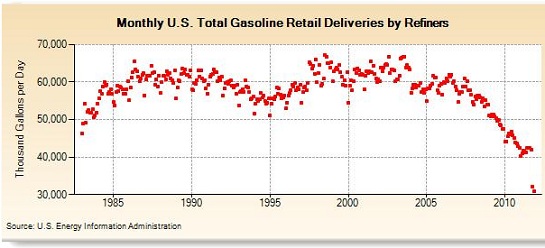The author of "Do The Math" has finished his examination of alternative energy sources. Here's the summary conclusion (emphasis mine):
http://physics.ucsd.edu/do-the-math/...energy-matrix/
End of an Era
Not only does this conclude the end of the phase on Do the Math where we evaluate the quantitative and qualitative benefits and challenges of alternatives to fossil fuels, it also points to the fact that we face the end of a golden era of energy. Sure, we managed to make scientific and cultural progress based on energy from animals, slaves, and firewood prior to discovering the fossil fuels. But it was in unlocking our one-time inheritance that we really came into our own. Soon, we will see a yearly decrease in our trust fund dividend, forcing us to either adapt to less or try to fill the gap with replacements. What this post and the series preceding it demonstrates is that we do not have a delightful menu from which to select our future. Most of the options leave a bad taste of one form or the other.
When I first approached the subject of energy in our society, I expected to develop a picture in my mind of our grandiose future, full of alternative energy sources like solar, wind, nuclear, biofuels, geothermal, tidal, etc. What I got instead was something like this matrix: full of inadequacies, difficulties, and show-stoppers. Our success at managing the transition away from fossil fuels while maintaining our current standard of living is far from guaranteed. If such success is our goal, we should realize the scale of the challenge and buckle down now while we still have the resources to develop a costly new infrastructure. Otherwise we get behind the curve, possibly facing unfamiliar chaos, loss of economic confidence, resource wars, and the unforgiving Energy Trap. The other controlled option is to deliberately adjust our lives to require fewer resources, preferably abandoning the growth paradigm at the same time. Can we manage a calm, orderly exit from the building? In either case, the first step is to agree that the building is in trouble. Techno-optimism keeps us from even agreeing on that.
http://physics.ucsd.edu/do-the-math/...energy-matrix/
End of an Era
Not only does this conclude the end of the phase on Do the Math where we evaluate the quantitative and qualitative benefits and challenges of alternatives to fossil fuels, it also points to the fact that we face the end of a golden era of energy. Sure, we managed to make scientific and cultural progress based on energy from animals, slaves, and firewood prior to discovering the fossil fuels. But it was in unlocking our one-time inheritance that we really came into our own. Soon, we will see a yearly decrease in our trust fund dividend, forcing us to either adapt to less or try to fill the gap with replacements. What this post and the series preceding it demonstrates is that we do not have a delightful menu from which to select our future. Most of the options leave a bad taste of one form or the other.
When I first approached the subject of energy in our society, I expected to develop a picture in my mind of our grandiose future, full of alternative energy sources like solar, wind, nuclear, biofuels, geothermal, tidal, etc. What I got instead was something like this matrix: full of inadequacies, difficulties, and show-stoppers. Our success at managing the transition away from fossil fuels while maintaining our current standard of living is far from guaranteed. If such success is our goal, we should realize the scale of the challenge and buckle down now while we still have the resources to develop a costly new infrastructure. Otherwise we get behind the curve, possibly facing unfamiliar chaos, loss of economic confidence, resource wars, and the unforgiving Energy Trap. The other controlled option is to deliberately adjust our lives to require fewer resources, preferably abandoning the growth paradigm at the same time. Can we manage a calm, orderly exit from the building? In either case, the first step is to agree that the building is in trouble. Techno-optimism keeps us from even agreeing on that.


 Thanks for your answers.
Thanks for your answers.


Comment